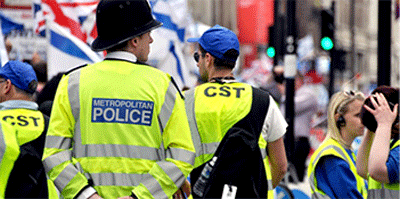Wider World
News + Politics
England: Worries in a Golden Age

Natalie, a mother of three, was chatting to a worker at a children’s play center in the heart of Jewish London when a party of kippa-wearing boys came in. “Because I don’t look Jewish,” she recalled, “he turned to me and sighed, ‘Oh no, Jews.’ I turned to him and asked what he meant by that. ‘They’re just like animals. These Jews are the worst.’ I felt physically sick—my heart was palpitating.”
The incident, which prompted her to complain to the manager, seems typical of the low-grade anti-Semitism in Britain. According to the Community Security Trust, which handles security issues for Britain’s 270,000 Jews, 75 percent of incidents in 2014 involved “abusive behavior,” which includes hate mail, graffiti, comments on social media and verbal abuse targeted at random Jews in the street. Just 6 percent involved physical violence.
And yet, the total number of incidents—1,168—was more than double the 535 recorded in 2013, and the highest ever recorded. CST spokesman Mark Gardner said this is mostly a result of a spike during the Gaza war, but figures were rising anyway in the first six months of the year. Since 2000, he said, “there has been a qualitative and quantitative increase, with anti-Israel hatred as either the driver or trigger for greater anti-Semitism, and more obvious presence of Muslims as perpetrators.”
The government contributes to security costs for Jewish institutions and cooperates closely with the Jewish leadership; since the 2006 All-Party Enquiry Into Antisemitism, it is generally agreed that government leaders recognize the problem.
Indeed, in other respects, this is a golden age for British Jewry. Some 60 percent of Jewish children go to mostly state-funded Jewish schools—up from 25 percent in the 1970s. There is a flourishing of British-Jewish literature and arts, and the opening of a $75-million Jewish community center in London in 2013 was symbolic of a larger thriving of communal facilities.
According to a 2012 report by the Institute for Jewish Policy Research, “[A]nti-Semitism in Britain…continues to be one of the top issues on the Jewish communal agenda…. At the same time, British Jews have arguably never before been so confident about their Jewishness, and so open about displaying it in public places.”
But there has been a shift in the communal mood in recent months: This follows the Gaza war last summer; a rise in awareness of jihadi activity in Britain, and the flow of British Muslims to fight for the Islamic State; and the rise of anti-
Semitism on the continent. Following the attack on the Paris Hypercacher market, more than 150 British Jews contacted the CST to volunteer.
“People watched it on a 24-hour news cycle and know it could have happened here,” said Gardner. “It had tremendous impact.” Several months later, he said, “the alarm has subsided, but it hasn’t completely gone. The basic level of anxiety is at a different place than before Paris.”
Natalie, for one, aims to move to Israel: “I was so distraught by some of the things that my colleagues were putting on their Facebook feeds about Israel during the Gaza war, I feel that there’s no future here.” So far, she is in a tiny minority. But the rest of Anglo-Jewry is certainly jumpier than it used to be.
Miriam Shaviv is a columnist for the Jewish Chronicle in the United Kingdom.










 Facebook
Facebook Instagram
Instagram Twitter
Twitter
Leave a Reply